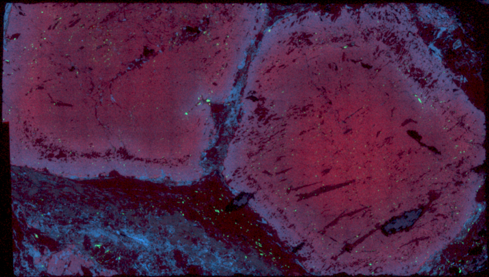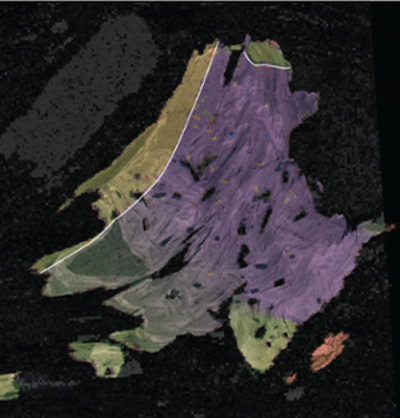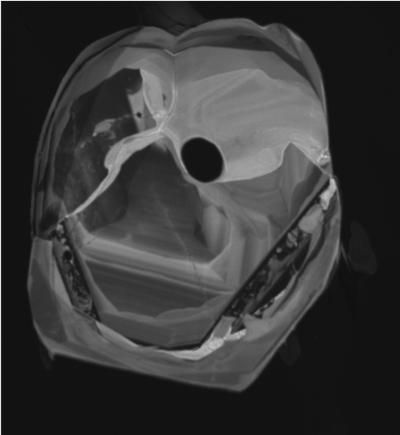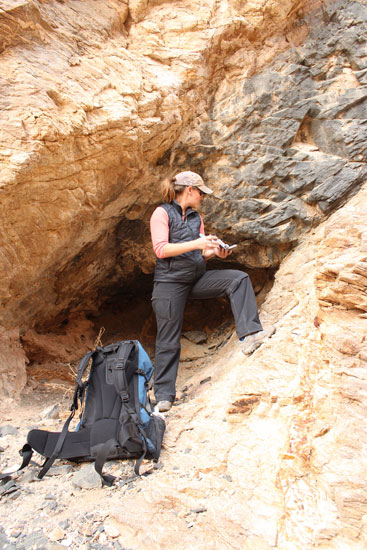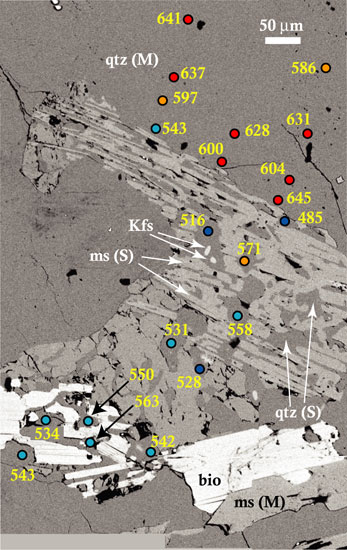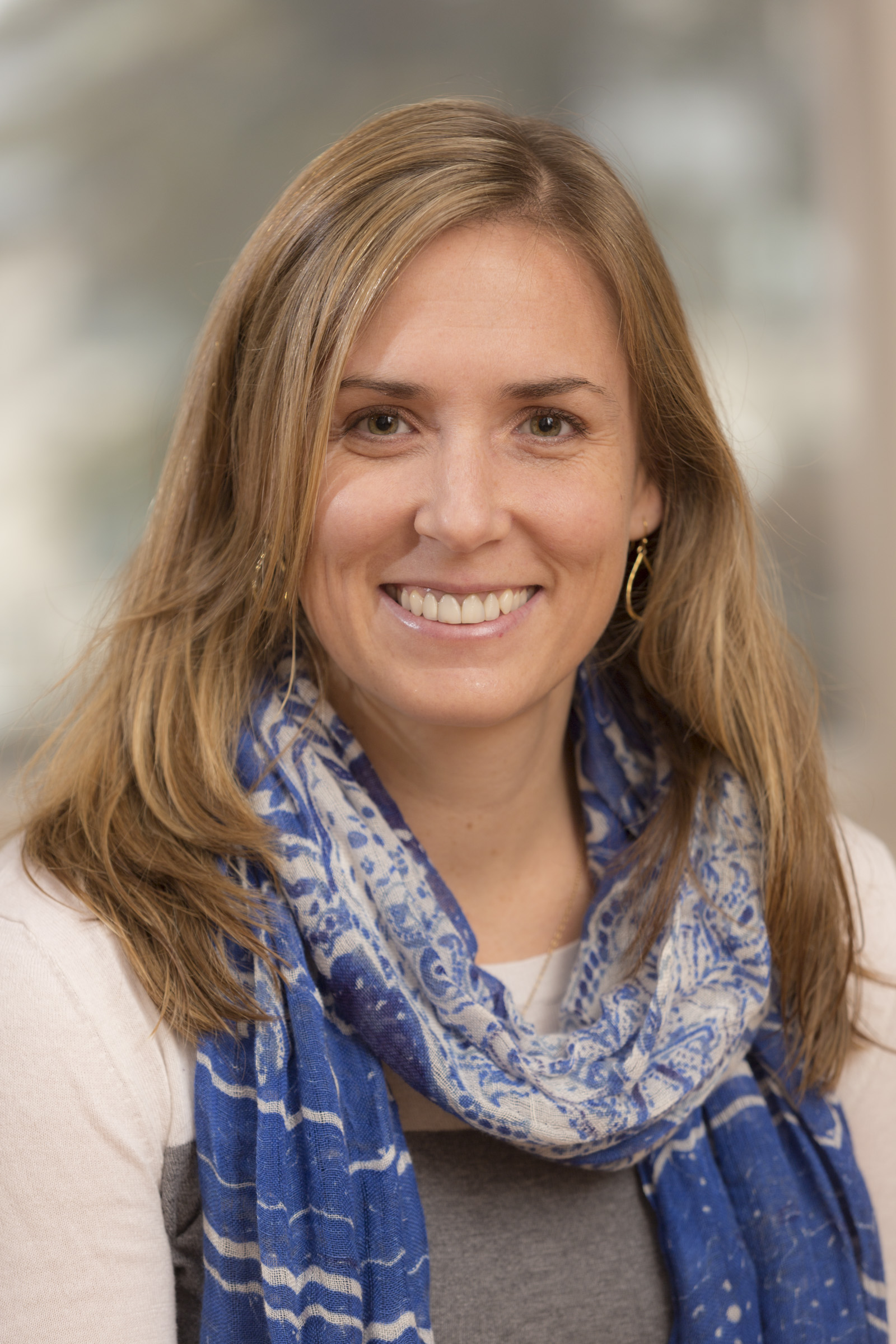Hillenbrand, Ian, Williams, Michael L., Peterman, Emily M., Jercinociv, Michael J., and Dietsch, Craig., 2024, Petrochronologic constraints on Inverted Metamorphism, Terrane Accretion, Thrust Stacking, and Ductile Flow in the Gneiss Dome Belt, Northern Appalachian Orogen. NE GSA Meeting, Manchester, NH. Geological Society of America Abstracts with Programs. Vol. 56, No. 1, doi: 10.1130/abs/2024NE-397436
Haugen, Ella B., Harris, Holly E., Peterman, Emily M., and West, D.P. Jr., 2024, U-Pb Zircon Geochronology and EBSD Analysis of Rocks in the Passagassawakeag Gneiss, Mid-Coast Maine. NE GSA Meeting, Manchester, NH. Geological Society of America Abstracts with Programs. Vol. 56, No. 1, 2024 doi: 10.1130/abs/2024NE-397292
*Peterman, E.M., Reddy, S.M., Ault, A.K., Saxey, D., Fougerouse, D., and Jensen, J.L., 2023, Earthquakes and atoms: Nanoscale insights into fault evolution. Atom Probe Tomography and Microscopy Biennial Conference; Leuven, Belgium
Deng, Z., Jia, Z., Peterman, E., Stoddard, M., and Li, L., 2023, A systematic, phylogeny-based study of the structural, crystallographic, and mechanical properties of avian eggshells. TMS Annual Meeting and Exhibition, Biological Materials Science.
Deng, Z., Jia, Z., Loh, H., Masic, A., Peterman, E., and Li, L., 2023, Prestressing bioceramics: On the structural origins and mechanical significance of residual stresses in sea urchin spines. TMS Annual Meeting and Exhibition, Biological Materials Science.
Peterman, E., Williams, M.L., and Harris, H.E., 2022, Evidence for UHP metamorphism in strongly overprinted rocks, Rhodope Metamorphic Complex, Greece. Geological Society of America Abstracts with Programs. Vol. 54, No. 5. doi: 10.1130/abs/2022AM-379147
Johnson, S.A., West, D. Jr., and Peterman, E., 2022, Petrology, age, and geochemistry of the Yarmouth Island formation, Casco Bay, Maine: insights into the Paleozoic tectonic evolution of mid-coastal Maine. Geological Society of America Abstracts with Programs. Vol. 54, No. 5. doi: 10.1130/abs/2022AM-377984
Sullivan, W.A., O'Hara, E., and Peterman, E., 2022, Strain localization mechanisms and damage zone microstructures across the brittle-ductile transition: A case study of the Kellyland Fault Zone. Structural Geology & Tectonics Forum. June 20-25, 2022.
Hillenbrand, I., Williams, M.L., Peterman, E., Jercinovic, M.J., Dietsch, C., and Millonig, L., 2022, Unraveling inverted metamorphism and gneiss dome formation with multi-mineral petrochronology. UK Metamorphic Studies Group Virtual Research in Progress Meeting. April 14, 2022.
West, D.P. Jr., and Peterman, E.M., Contact relationships between the Liberty-Orrington and Fredericton Belts in the Boothbay Region, Mid-coastal Maine. Northeast Meeting of the Geological Society of America. March 20-22, 2022.
Hillenbrand, I., Williams, M.L., Peterman, E., Jercinovic, M.J., Dietsch, C., 2021, Petrochronologic constraints on accretion, extrusion, and inverted metamorphism in the gneiss dome belt, Appalachian orogen. Geological Society of America Abstracts with Programs. Vol. 53, No. 6.
*Peterman, E.M., Reddy, S.M., Saxey, D.W., Fougerouse, D., Jercinovic, M.J., Williams, M.L., and Quadir, Z., 2021, Nanoscale evidence of metamorphism – insights from natural and experimentally-treated zircon. vEGU21: Gather Online (virtual European Geosciences Union conference). GMPV7.1. April 17–30, 2021.
West, D.P., Jr. and Peterman, E.M., 2021, Magmatism along the Norumbega Fault System Corridor in Maine: A Review in Honor of Sheila Seaman. Northeast Meeting of the Geological Society of America. March 14–16, 2021.
Harris, H.E., Houlgate, L., Peterman, E.M., Williams, M.L. and Grove, M., 2021, Evidence of ultrahigh-pressure metamorphism in zircon from the Rhodope Metamorphic Complex, Eastern Greece. Northeast Meeting of the Geological Society of America. March 14–16, 2021.
Peterman, E.M., Reddy, S.M., Saxey, D.W., Fougerouse, D., Rickard, W.D.A., 2020, Thermally induced migration of trace elements in radiation damaged zircon. Atom Probe Tomography & Microscopy Biennial Conference. Oxford, UK, July 2020. Cancelled due to COVID-19
West, D.P., Jr., Peterman, E.M., and Chen, J., 2020, Igneous petrogenesis and overprinting deformation and metamorphism of the early Devonian Edgecomb Gneiss, mid-coastal Maine. Geological Society of America Abstracts with Programs. Vol. 52, No. 2 doi: 10.1130/abs/2020SE-344724 Cancelled due to COVID-19
Mako, C., Sargent, C., and Peterman, E.M., 2020, Quartz grain size piezometry and c-axis fabric thermometry in the Sandhill Corner Mylonite Zone: Implications for shear zone evolution. Geological Society of America Abstracts with Programs. Vol. 52, No. 2 doi: 10.1130/abs/2020SE-345363 Cancelled due to COVID-19
Webber, J.R., Kalakay, T.J., Peterman, E.M., McAleer, R., Mogk, D.W., 2019, Deciphering the tectonometamorphic evolution and localization of deformation within the Wyoming Province of southwest Montana. AGU Fall Meeting Conference.
Peterman, E.M., Reddy, S.M., Rickard, W.D.A., Saxey, D.W., Fougerouse, D., 2019, Correlations between TEM and APT Analyses of Nanoscale Features within Zircon, Goldschmidt Abstracts. Barcelona.
*Reddy, S.M., Saxey, D., Rickard, W., Fougerouse, D., Verberne, R., Kirkland, C., and Peterman, E., 2019, Mechanisms of radiogenic isotope redistribution in minerals: Evidence from the nanoscale. Goldschmidt Abstracts. Barcelona.
Calentti, M.C. and Peterman, E.M., 2019, Interpreting metamorphic histories preserved in kyanite. Northeast Meeting of the Geological Society of America, Portland, Maine. March 18-20, 2019.
Peterman, E.M., Reddy, S.M., Saxey, D.W., Snoeyenbos, D.R., Fougerouse, D., and Rickard, W.D.R., 2018, Atomic scale resolution of trace element variation in zircon reveals multiple metamorphic processes. Goldschmidt Abstracts, no. 2009. Boston, MA.
*Peterman, E.M., 2018, An analysis of three models to develop proficiency in college teaching. Geological Society of America Abstracts with Programs, Indianapolis, Indiana.
Peterman, E.M., and Eusden, J.D. Jr., 2018, Monazite geochronology records early Acadian and NeoAcadian tectonometamorphic events in midcoast Maine. Northeast Meeting of the Geological Society of America, Burlington, Vermont.
Peterman, E.M., Jercinovic, M.J., and de Wet. C.B., 2017, Cathodoluminescence domains correlate with compositional zoning in kyanite. Geological Society of America Abstracts with Programs, Seattle, Washington.
Reddy, S., Peterman, E., Saxey, D., Rickard, W., Fougerouse, D., and Marillo-Sialer, E., 2017, Characterization of nanoscale Pb mobility and entrapment in zircon using atom probe microscopy. Goldschmidt Abstracts, no. 3295.
Rickard, W., Reddy, S., Saxey, D., Fougerouse, D., Cavosie, A., and Peterman, E., 2017, Nanoscale trace element analysis of zircon via high spatial resolution SIMS in a FIB-SEM. Goldschmidt Abstracts, 3351.
Reddy, S., Saxey, D., Rickard, W., Fougerouse, D., Peterman, E., van Riessen, A., and Johnson, T., 2017, Nano is the next big thing: Revealing geochemical processes with atom probe microscopy, Geophysical Research Abstracts, Vol. 19, EGU2017-19280, 2017.
de Wet, C., Teeter, E., Peterman, E.M., and Beane, R.J., 2016, Optimizing cathodoluminescence imaging on the SEM, 2016, Geological Society of America Abstracts with Programs, vol. 48, no. 7., doi: 10.1130/abs/2016AM-285120
Peterman, E.M., Reddy, S., Saxey, D.W., Snoeyebos, D.R., Kylander-Clark, A., Rickard, W.D.A., and Fougerouse, D., 2016, Extracting geologic ages from isotopically distinct nanoscale reservoirs of Pb in discordant zircon by atom probe microscopy, Geological Society of America Abstracts with Programs, vol. 48, no. 7., doi: 10.1130/abs/2016AM-285451
Sullivan, W.A., and Peterman, E.M., A possible example of pulverized granite from the brittle-ductile transition, 2016, Geological Society of America Abstracts with Programs, vol. 48, no. 7., doi: 10.1130/abs/2016AM-283145
Reddy S.M., Peterman E.M., Saxey D.W., Rickard W.D.A., Fougerouse D., Snoeyenbos D.R. and Kylander-Clark A.R.C., 2016, Atom probe analysis of discordant zircon reveals preserved 207Pb/206Pb crystallisation ages in nanoscale dislocation loops, Second Conference of the European Mineralogical Union; Rimini, Italy.
Rickard, W., Reddy, S., Saxey, D., Fougerouse, D., van Riessen, A., Peterman, E., 2016, Correlative Analysis using FIB-ToF-SIMS and Atom Probe Tomography on Geological Materials, Atom Probe Tomography & Microscopy; Gyeongju, South Korea.
Peterman, E.M. and Snoeyenbos, D.R., 2015, Atypical dissolution-reprecipitation reactions in zircon from HP/UHP metapelites, Geological Society of America Abstracts with Programs, vol. 47, no. 7, p.168.
Snoeyenbos, D.R. and Peterman, E.M., 2015, Phosphatic garnet from metapelitic schists of western Massachusetts and eastern Greece, Geological Society of America Abstracts with Programs, vol. 47, no. 7, p.168.
Peterman, E.M., Burton, Z.F.M., Rubel, J.N., Snoeyenbos, D.R. and Kylander-Clark, A., 2014, Monazite petrochronology via LASS characterizes 30 Myr of episodic retrograde metamorphism in western Massachusetts, EOS Transactions American Geophysical Union; AGU 2014 Fall Meeting.
Hourigan, J., Grove, M., and Peterman, E., 2014, A multi-sample diffusion cell for noble gas analysis. Goldschmidt Abstracts, no. 1040.
Snoeyenbos, D.R., and Peterman, E.M., 2014, Solid state mass transfer reactions between zircon and garnet constrain an early Acadian UHP excursion in western Massachusetts, GAC-MAC Annual Meeting; Fredericton, New Brunswick, May 21–23, 2014.
*Peterman, E.M., Snoeyenbos, D.R. and Kylander-Clark, A., 2013, Early Acadian exhumation history of garnet-kyanite schists from western Massachusetts determined by LASS analysis of metamorphic monazite, EOS Transactions American Geophysical Union, AGU 2013 Fall Meeting, T38B-08.
Snoeyenbos, D.R., Peterman, E.M., Jercinovic, M.J., Williams, M.L., and Reinhard, D.A., 2013, Isotopic Tomography of Monazite, Mineralogical Magazine, v. 77, no. 5, p. 2231.
*Peterman, E.M., Snoeyenbos, D.R. and Kylander-Clark, A., 2013, Evidence of the Early Acadian in Western Massachusetts from high-pressure garnet-kyanite schist, Geological Society of America Abstracts with Programs, v. 45, no. 7, p. 239.
Peterman, E.M., 2013, Integrating field, geochemical and geophysical data in undergraduate courses to illustrate plate tectonics: Geological Society of America, Northeast Section Meeting, Abstract 215644.
Beane, R. J., Camill, P., Field, C., Laine, E., Lea, P.D., Peterman, E.M., Roesler. C., and Urquhart, J., 2013, Local research projects foster student learning in a growing undergraduate department: Geological Society of America, Northeast Section Meeting, Abstract 215499.
Peterman, E.M. and Hourigan, J.K., 2012, Using monazite (U-Th)/He to date deformation near the brittle-ductile transition, Structure and Tectonics Forum, Williams College.
Peterman, E.M., Grove, M., and Hourigan, J.K., 2011, Development and intercalibration of monazite (U-Th)/ He thermochronology: Catnip Sill, Santa Catalina Mountains, Geological Society of America Abstracts with Programs, v. 43, no. 5, p. 331.
Peterman, E.M., Grove, M. and Kimbrough, D.L., 2010, Quantifying Continental Margin Deformation North and South of the Opening of the Gulf of California—Evidence for Subduction Erosion? EOS Transactions American Geophysical Union, AGU 2010 Fall Meeting, V41B-2288.
Peterman, E.M., Hourigan, J.K. and Grove, M., 2010, Laser heating of monazite to simultaneously determine He diffusion parameters and (U-Th)/He ages, Geological Society of America Abstracts with Programs, v. 42, no. 5.
Peterman, E.M. and Grove, M., 2010, Linking Temperature to Time in Retrograde Metamorphism: Ti-in-Quartz + Rb/Sr of Muscovite in preserved Ms + Qtz Symplectite, Geochimica et Cosmochimica Acta, v. 74, 11S1, A809.
* Denotes invited contribution
Denotes Bowdoin undergraduate
